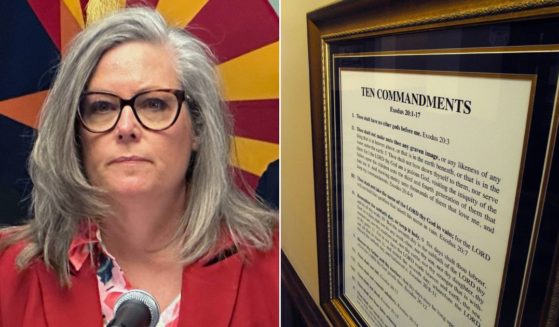Supreme Court Hands Huge Free Market Win to Business Owners with Disabled Daughter
The Supreme Court just delivered an important victory for economic freedom and the free market.
Wednesday’s decision centered on whether Doug and Mary Ketchum could open Kimbrough Wines & Spirits in Memphis, Tennessee, even though they did not meet the requirements of the 21st Amendment of Tennessee’s Constitution. The 21st Amendment prohibits people from selling liquor in the state until they have been a resident within the state for two years.
The court ruled in favor of the Ketchums in a 7-2 decision and held that the amendment was unconstitutional.
“The Ketchums had moved to Tennessee from Utah in 2016 to save the life of their 34-year-old daughter, Stacie, who suffers from cerebral palsy and quadriplegia,” the Institute for Justice reported.
“When one of Stacie’s lungs collapsed during a temperature inversion that severely worsened the air quality in the Salt Lake valley, her doctor urged the Ketchums to move to a healthier climate or risk losing Stacie within a year, prompting their move to Tennessee.”
Shortly after their move, the Ketchums applied for a license to operate a liquor store in the heart of the city.
Although the Tennessee Alcoholic Beverage Commission intended on signing off on the application, a problem arose.
The Tennessee Wine and Spirits Retailers Association threatened a lawsuit against the TABC if it granted the Ketchums’ license. In response, the TABC filed in state court and requested a declaratory judgment that the 21st Amendment was unconstitutional.
The case was removed to the United States District Court for the Middle District of Tennessee where the court found the durational residency requirements to be unconstitutional. At this point, the Ketchums were issued their liquor licenses.
Although the State of Tennessee seemed satisfied and chose not to pursue the matter, the TWSRA was not as pleased and appealed to the Court of Appeals of the Sixth Circuit. That court affirmed as well. The TWSRA then appealed to the Supreme Court.
The Supreme Court’s Wednesday decision upheld the lower court and found “Tennessee’s 2-year durational-residency requirement applicable to retail liquor store license applicants violates the Commerce Clause and is not saved by the Twenty-first Amendment.”
Doug Ketchum was thrilled with the ruling.
“This is the culmination of a long three-year lawsuit that had us worrying if we were going to be bankrupt,” Ketchum told Commercial Appeal.
“To have the Supreme Court come out and rule the way they did, it’s a great day for us and it’s a great day for the Constitution. We couldn’t be happier. We don’t have to look over our shoulder anymore. We’re not worried about whether or not something is going to happen.”
In a statement released by the Institute for Justice, which was responsible for litigating the Ketchum’s case, Ketchum said, “This has been three years of nail-biting, waiting for this final opinion. This decision now means no more looking over our shoulder and worrying if they’re going to take away our license.”
“Now we can get on with growing our business and earning the resources we need to care for our daughter over the long haul and provide for our retirement someday,” he added.
Curt Runger, a Tennessee attorney specializing in small business and civil litigation, told Conservative Tribune, a section of The Western Journal, the court’s ruling was “a slam dunk.”
“The SCOTUS ruled correctly on this issue which seemed to be a relatively straight-forward legal issue to all parties involved except for the Tennessee Wine and Spirits Retailer’s Association,” Runger said.
“Tennessee’s durational residency requirements on individuals and companies wishing to operate retail liquor stores clearly was unconstitutional and in direct violation of the Commerce Clause which restricts state protectionism and functions to remove trade barriers.”
“TN’s residency requirement plainly favors Tennesseans over non-residents while discriminating against non-residents, and the law failed to show that it was narrowly tailored to advance a legitimate local purpose,” Runger told Conservative Tribune.
In Runger’s mind, the case was not a close call.
“It is laughable to think that the residency requirement being defended by the TWSRA in any way, shape or form relates to the public health and safety of Tennesseans and promotes responsible alcohol consumption,” Runger said.
“To the contrary, the residency requirement is a pretty transparent attempt to discriminate against non-resident individuals and companies and protect Tennessee vendors in violation of the Commerce Clause.”
Anya Bidwell, an attorney with the Institute of Justice added, “To put it mildly, today’s opinion by Associate Justice Samuel Alito and the six justices of the Court who joined with him was an indictment against in-state economic protectionism.”
Scott Bullock, the President of the Institute of Justice, was emphatic the ruling was a win for Americans.
“This opinion makes it clear the Court believes that the major purpose of the Commerce Clause is to prevent states from passing laws simply to favor its own residents,” Bullock said.
“We plan on building on this precedent today to strike down other blatantly protectionist laws, whether across state lines or favoring one group of in-state businesses over another.”
Truth and Accuracy
We are committed to truth and accuracy in all of our journalism. Read our editorial standards.











